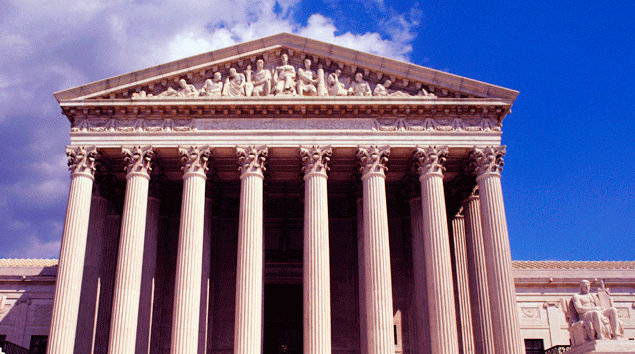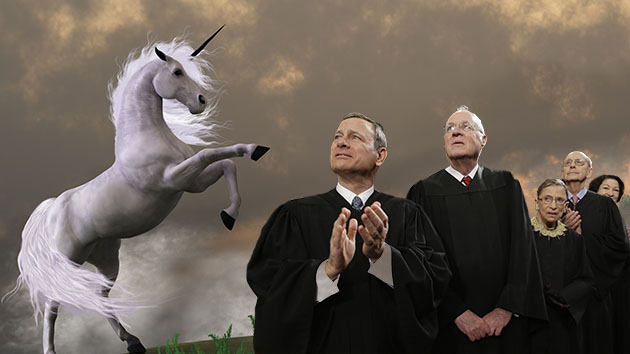
Glow Images via AP Images
The Supreme Court on Monday ruled against a challenge to Texas’ redistricting methods in a case that could have dramatically tilted elections nationwide in favor of Republican candidates.
In Evenwel v. Abbott, Sue Evenwel and Ed Pfenninger had sued the state of Texas over its 2010 redistricting map, contending that it diluted their votes—i.e., those of largely white, rural residents—by basing legislative districts on total population as opposed to eligible voters. Such a method of drawing districts, they argued, meant that urban areas with large numbers of illegal immigrants or felons would have more representation in the state legislature than rural areas with fewer people but a higher percentage of eligible voters. They wanted the court to force a uniform national standard on states requiring them to draw districts based on eligible voters. This would have diminished the electoral clout of America’s cities, which tend to vote Democratic, and given an edge to the Republican Party by empowering the rural enclaves where the party has a large base of support.
Virtually every state calculates legislative districts based on total population. If Evenwel and Pfenninger had prevailed, states would have seen their legislative maps thrown into chaos. But the court ruled unanimously that total population was a reasonable way for states to design legislative districts.
Justice Ruth Bader Ginsburg penned the majority opinion, noting that because of the “infirmity of the appellants’ claims,” the court didn’t need to address the question of whether it might be permissible for states to base legislative districts on eligible voters.
Liberal groups, who have been watching this case closely, cheered the ruling. Caroline Fredrickson, president of the American Constitution Society, said in a statement, “As states across the country implement new voting restrictions at breakneck speed, it is vital to reaffirm our commitment to equal representation for all people. We still have a long way to go to ensure that all Americans have a voice in our government, and today’s decision is an important start.”
The plaintiffs in Evenwel were recruited by Edward Blum, a man who’s made a career out of trying to kill off affirmative action and the Voting Rights Act by way of the Supreme Court through his organization, Project on Fair Representation. (Blum is also behind another case before the court this term, Fisher v. University of Texas, which challenges the university’s use of race in admissions decisions.)
Evenwel is a tea party and GOP activist in Titus County, Texas. As Mother Jones reported in December:
In 2012, the Evenwel-led Titus County GOP hosted a screening of Dreams From My Real Father: A Story of Reds and Deception, the docudrama that suggests Obama’s real father was Frank Marshall Davis, a man the film’s promotional material describe as a “Communist Party USA propagandist who likely shaped Obama’s world view during his formative years.” On her Facebook page, Evenwel has also approvingly touted a story from the conservative website WorldNetDaily questioning whether Obama was really born in America.
Evenwel is an outspoken critic of illegal immigrants, and she has claimed on the Titus County GOP’s website that the state’s present legislative boundary-drawing process has the primary objective of giving “equal representation to a block of undocumented people who are not eligible or registered to vote.” Evenwel has also lashed out at Muslims, warning in an op-ed that showing tolerance to them means that Shariah law could “usurp the US Constitution.” And she has claimed that all money donated to mosques funds jihad.
Pfenninger, her co-plaintiff, also has a colorful background. Mother Jones reported last year that Pfenninger held religious views far outside the mainstream and rejected modern scientific principles, including the basic notion that the Earth revolves around the sun:
A Christian fundamentalist who works as a security guard in Porter, Texas, Pfenninger operates a YouTube channel where he’s posted hours of videos of himself expounding on his beliefs. For instance, he’s described the Catholic Church as “the Mother of Harlots.” He’s also said that Jews are “enemies of the cross,” and that God created Adolf Hitler and the Holocaust because he “wanted the Jews back into the Land.” Pfenninger also cites the Bible to justify his belief that women with short hair are somehow shameful. In response to a commenter on one of his videos, he wrote:

Pfenninger has scorned science and claimed that “geocentricity”—the medieval belief that the Earth is the center of the universe—”is a Bible fact. It its not theory…the earth is standing still in the middle of the universe.” The notion that the Earth revolves around the sun, according to Pfenninger, “is part of the Copernican revolution, which is anti-Biblical, and in fact led to the acceptance of evolution. Christians will fight against evolution but you’ve got to go a little further back and fight against the root of evolution, which is the heliocentric movement.”
And then there’s the unicorn, which appears repeatedly in Pfenninger’s online posts. Arguing with a commenter to one of his YouTube videos, Pfenninger wrote in 2013 that the “unicorn was a real creature known for it’s [sic] great strength, and is also referred to in ancient literature.” Pfenninger did not respond to an email requesting comment.
Blum issued a statement criticizing the Supreme Court’s ruling. “We are disappointed that the justices were unwilling to reestablish the original principle of one-person, one vote for the citizens of Texas and elsewhere,” he said. “The issue of voter equality in the United States is not going to go away. Some Supreme Court cases grow in importance over time and Evenwel v. Abbott may likely be one of those cases.”







